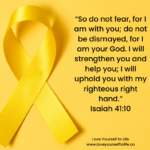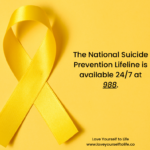I’ve been there, deep in the darkness, where thoughts of death by suicide seemed like the only way out. Not once, but twice in the same night, I attempted to take my own life. By the grace of God, I’m still here to tell my story, to be a voice of hope for those who are where I once was—desperate, hopeless, and drowning in an ocean of darkness.
I know what it’s like to live with a mind clouded by despair, where the weight of sadness feels suffocating, and the pain seems too unbearable to carry for another day. If you’re reading this and battling those thoughts, I want you to know that you’re not alone, even when it feels like it. Your life is precious, and there is hope, even when the darkness feels overwhelming.
The Darkened Mindset: Where Despair Finds Its Home
Living with a darkened mindset is exhausting. It can cloud your every thought, making it difficult to see beyond the pain and confusion. You might feel trapped in your own mind, locked in a cycle of negative thoughts that tell you life will never get better, and that you are a burden to those around you.
This mental state can lead to consistent thoughts of taking your own life, not because you want to die, but because you want the pain to stop. It’s a dangerous place to be because the darkness begins to distort your perception of reality, convincing you that your life no longer has value, and that no one would care if you were gone.
But that’s a lie. The pain you feel today, as intense as it may be, is temporary. It’s not the end of your story, even though it feels like it. The darkness may whisper that no one understands or that you’re too far gone, but there is always a way out—there is always hope.
Suicide: A Global Issue
Statistics about suicide paint a sobering picture of the magnitude of this issue. According to the World Health Organization, nearly 800,000 people die by suicide every year, which equates to one death every 40 seconds. This isn’t just a number—it’s a person, a life, and a story that ended too soon.
In the United States alone, suicide is the 10th leading cause of death, and for people between the ages of 10 to 34, it’s the second leading cause. These numbers are tragic, but they highlight something crucial: suicide doesn’t discriminate. It’s not limited to a particular race, nationality, or social status. It impacts people from all walks of life, from high-powered executives to stay-at-home parents, students, celebrities, and even pastors.
I want to emphasize this: no one is immune. Mental health issues and thoughts of suicide don’t care about your profession, how much money you have, or the image you project to the world. Some of the most seemingly put-together people are silently fighting a battle with their own minds. We often hear, “But they didn’t seem depressed” or “They never showed any signs.” That’s the terrifying truth about mental health—someone can be struggling deeply while appearing perfectly fine to the outside world.
Signs Aren’t Always Visible
One of the biggest misconceptions about suicide is that a person will always show signs before making an attempt. Yes, there are warning signs—talking about wanting to die, withdrawing from loved ones, increased substance use, and expressing feelings of hopelessness—but not everyone exhibits these behaviors.
Some people hide their pain remarkably well. They continue to go to work, smile for photos, and even make plans for the future. Their struggles are internal, invisible to the outside world, which is why it’s so important that we check in on one another.
Ask the difficult questions. “How are you, really?” doesn’t mean prying, but it shows care and concern. Sometimes, those battling suicidal thoughts are waiting for someone to notice, to reach out, to see their pain. Let’s be the ones who see, who ask, and who listen.
Scriptures to Strengthen You in Dark Times
As a Christian, I’ve turned to the Bible countless times in my darkest moments. I believe the Word of God is a source of healing and strength for our souls, especially when we feel overwhelmed by the weight of our thoughts.

In moments when life feels unbearable, know that God is near. He sees your pain, and He cares. You are not alone in your suffering.

God promises to give us strength in our weakest moments. Even when we don’t have the will to carry on, He is there to sustain us, to help us through the darkest valleys.
Encouragement: Seek Help, You Don’t Have to Struggle Alone
One of the most dangerous aspects of living with suicidal thoughts is the isolation that often accompanies them. It’s easy to feel like no one understands, like you’re fighting this battle by yourself. But please, I beg you—reach out for help. There is no shame in admitting that you are struggling.
Proverbs 11:14 says, “Where there is no counsel, the people fall; but in the multitude of counselors, there is safety.” Seeking professional help is not a sign of weakness; it’s a sign of strength and wisdom. Counselors and therapists are equipped to walk alongside you in your pain, to offer guidance and support that can help you see the light in your darkest moments.

If you’re feeling overwhelmed right now, please call. Talk to someone.
You don’t have to go through this alone.
This Pain Will Pass
One of the biggest lies that the darkness tells us is that our current pain is permanent. It convinces us that nothing will ever get better, that the sadness and despair we feel today will last forever. But that’s not true.
Ecclesiastes 3:1 reminds us that, “There is a time for everything, and a season for every activity under the heavens.” Your pain is a season. It’s not the entirety of your life. Seasons change, and so will the heaviness you’re feeling right now. Healing is possible, even when it seems far away. Better days will come, and you will smile again, laugh again, and experience joy again.
What Can You Do to Remove the Heaviness?
If you’re feeling overwhelmed right now, I want you to take a deep breath. You may not be able to control the circumstances that led you to this point, but you can take steps to lift some of the weight you’re carrying.
Ask yourself:
- Who can I reach out to today?
- Who is someone I trust, who will listen without judgment? It might be a friend, a family member, a pastor, or a professional. Talking about your feelings can help break the power of the darkness.
What simple thing can I do today that brings me peace?
- It doesn’t have to be grand—something as simple as sitting outside, listening to music, or praying can start to lighten the load.
What does God say about me?
When the darkness tells you that you’re worthless, that no one cares, or that your life has no meaning, remember what God says:
“For you created my inmost being; you knit me together in my mother’s womb. I praise you because I am fearfully and wonderfully made.” (Psalm 139:13-14).

You Are Not Alone
If you’re struggling right now, please know that your life has immense value. I know how hard it is to see that when you’re in the depths of despair. I’ve been there too, and I know the pain you’re feeling. But I also know that there’s hope on the other side of this darkness.
Don’t let these thoughts have the final say.
Reach out.
Ask for help.
Keep holding on, even when it’s hard.
God is with you in this storm, and He will guide you through it.
You are not alone.
You are loved.
You are needed.
And there is so much more to your story that has yet to be written.
Hold on to hope.
With Love & Support,
Dr. Monica
#love2life

